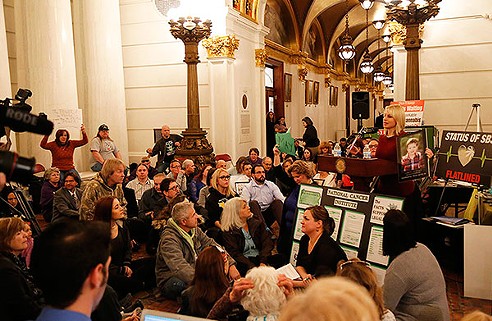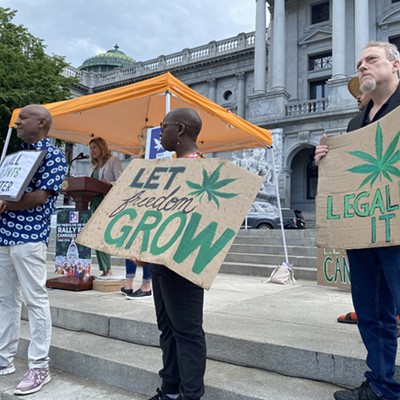One way or another, it looks like Pennsylvania’s medical-marijuana law will finally be decided. Over the past two years, the bill has been debated and stalled; it’s even passed the state Senate twice without ever being brought forward for debate on the state House floor.
And while the bill will come up for a debate and probably a vote during the next legislative session, which begins March 14, relief for sick Pennsylvanians could be a long way off even if it passes.
As City Paper reported in February, a bipartisan House committee has made recommendations on Senate Bill 3, the medical-cannabis legislation that already cleared the Senate. And last week, Speaker of the House Mike Turzai (R-Bradford Woods), a staunch opponent of medical marijuana, told reporters that he is ready to have the bill debated on the House floor on March 14.

However, even if the bill passes, patients could wait two to three years to actually receive Pennsylvania-regulated cannabis medication, according to Patrick Nightingale of Pittsburgh NORML, a marijuana-advocacy organization. And while the current bill has been saddled with hundreds of proposed amendments, none of them includes language that would decriminalize marijuana possession for many of those who would qualify for the medication under any approved law.
“We’ve seen this theme all along,” says Nightingale. “For each accomplishment, we have another body of work in front of us. We have so much more work to be done to put together the law.”
The path of medical-marijuana legislation in Pennsylvania has been a long and bumpy road. The first attempt to pass a medical-cannabis law came in 2014, when S.B. 1182 cleared the Senate by a 43-7 vote, but was stalled in the House and never reached the floor. Its rewrite, S.B. 3, passed the Senate by a 40-7 margin in May 2015 after three rounds of amendments. Upon entering the House, the bill was transferred, some say miraculously, out of anti-pot Republican Matt Baker’s health committee to Republican House Majority Leader and pro-medical-cannabis legislator Dave Reed’s rules committee. The bill then underwent 10 months of deliberation in the rules committee, and all told, has had more than 200 amendments added on, with potentially more to come once it hits the House floor.
And even if it finally clears these hurdles, S.B. 3 is not a hard-and-fast law that will immediately take effect. Instead, says Nightingale, the law will establish an advisory board that will then work to set up rules and regulations around licensing, implementation, penalties, etc. Then dispensaries need to be built and the plants need to grow. This whole process could take two to three years, which Nightingale says has not been an uncommon amount of time for states with medical marijuana.
“Medical cannabis does not magically appear when the bill is signed,” acknowledges Nightingale’s cross-state cohort, Chris Goldstein of Philly NORML.
But for some Pennsylvanians, like Jessica Hawkins of Beechview, patiently waiting for the bill to pass and dispensaries to pop up is not an option. Last summer, CP wrote about how the mother of two has decided to provide her daughter Antania with medical-cannabis oil because it has proven to be the best option to help her avoid the debilitating seizures caused by Dravet syndrome. But every time Hawkins administers the oil to her daughter, she is breaking Pennsylvania law.
“There are lot of people that don’t understand Dravet syndrome,” says Hawkins. “Any seizure that these children have could be their last.”
Luckily for Hawkins, the most current draft of the bill has a provision that says parents or guardians of minors are immune from prosecution if they “lawfully obtain,” out of state, medical marijuana to administer to those minors. However, federal law prohibits marijuana in any form from being transported across state lines.
But this provision for minors does not factor in the thousands of adult Pennsylvanians who suffer from cancer, Parkinson’s disease, multiple sclerosis and a dozen other conditions that would qualify them to receive medical cannabis under the new law. Nightingale would like to see something in place “where a patient can at least raise a medical defense if they are charged with possession of cannabis.”
Democratic state Sen. Daylin Leach of Montgomery County, one of the bill’s sponsors and probably its longest-standing proponent in the state, agrees.
“We would like to see some protections for people in the ramp-up period,” says Leach. “If everyone knows it is going to become legal, it would be hard to prosecute some poor guy with cancer.”
In 2014, Leach wrote letters to every county district attorney in the state asking them not to prosecute people who use cannabis for medical purposes. He says many of them responded that they were already doing that, but “certainly not all 67 DAs.”
Democratic House Rep. Dom Costa, of Stanton Heights, sits on the rules committee that is working on S.B. 3 in its run up to the potential House vote. He says that the committee is considering further decriminalization for Pennsylvanians who would qualify for medication in the period before dispensaries are ready to provide state-regulated cannabis.
“I am very hopeful it will pass,” says Costa. “And that should give people some optimism, since I am a former police officer. … [It used to be,] ‘you say marijuana, and I say arrest.’ It was an unfortunate thing.”
Costa adds that once it passes, there is room to tweak along the way within the advisory board and implementation process.
But Goldstein of Philly NORML, also the marijuana columnist for Philly.com, questions the make-up of the advisory board and whether the state will have the patient’s best interests at heart. He says the advisory board will consist mostly of police officers.
“You want to see doctors and patients and families and advocates on the board,” says Goldstein. “Do you want to go to your police chief when you need medication?”
Costa says that while police officers will sit on the advisory committee, medical professionals will also be included.
Goldstein worries that Pennsylvania is making many of the same mistakes that New York and New Jersey made in passing their medical-marijuana laws. He says overly restrictive legislation has led, in New Jersey, to high costs: a $200 biennial registration fee for patients, and $500 per ounce for cannabinoid oil. And in New York, registration has been low: about 1,400 patients in a state of 20 million. He says that problems like these can lead patients who qualify to utilize the black market to obtain cannabis, which leaves them vulnerable to prosecution.
Goldstein also says Pennsylvania still averages 18,000 marijuana-possession arrests per year, and to “say that all of [the arrested] are looking to get high recreationally is a falsity.” In Bucks County, Michael and Erika Zorn were charged with possessing and manufacturing marijuana in March 2015. Erika Zorn, a mother of two and then a manager of an eyeglass store, suffers from lupus, an autoimmune disorder, and grew and smoked marijuana to treat her disease. The two eventually pleaded guilty to a misdemeanor and received a year of probation.
Republican Sen. Mike Folmer, of Lebanon County, S.B. 3’s primary sponsor, says that he wants to see more protections for patients who will qualify for medical marijuana, but that on his side it is too late to add such language into the bill. “I don’t want to do anything that will blow up the eventuality of passing the bill.”
He has derided the long process of amending the bill over and over, saying, “We are still trying to treat cannabis as one of the most dangerous medicines in terms of regulations.”
Folmer says that if he can support this bill, given his party and his background, then the more conservative members of the House should get behind it too.
“I am a Bible-believing adult Presbyterian. This is not about being a stoner,” says Folmer. “It’s about using a plant to help people’s quality of life and adding another arrow in a patient’s quiver.”
Goldstein emphasizes that the time the bill spends on the House floor is important, too. He says since the two-year legislative period ends in December, if the bill does not get finalized before end of the year, the entire process will have to start over again.














